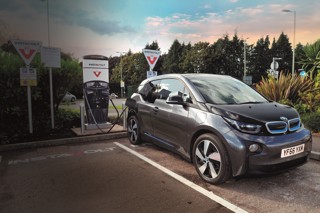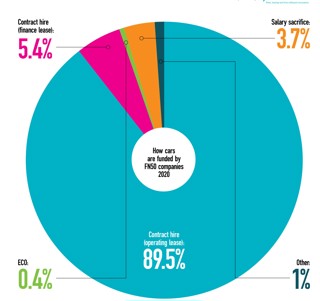Salary sacrifice for cars is seeing a resurgence as low benefit-in-kind tax rates for electric vehicles is making an economically attractive option to employees and employers, says Deloitte.
Under the funding method, an employee sacrifices a proportion of their salary before tax and national insurance is applied in return for a fully-funded car, with maintenance and insurance also included.
This has the potential to save drivers thousands of pounds a year compared to funding their own vehicles through a personal lease, while employers can also make national insurance savings.
However, the funding method had been declining in popularity since 2017 when the Government introduced the optional renumeration arrangements (OpRA) legislation, which effectively removed its tax and NI efficiency as it meant an employee would be taxed on the greater of the value of the benefit or the salary they gave up.
But Simon Down, associate director on the car consulting team at Deloitte, said an exemption for vehicles with 75g/km of CO2 or less – and the increasing numbers of battery electric vehicles and plug-in hybrids available - has made salary sacrifice an attractive proposition again,
“Salary sacrifice for electric vehicles is extremely popular,” he added.
“£886 a month was out of my price range unfortunately, but by dong it through salary sacrifice I’m effectively paying a lot of the cost out of gross salary, saving 42% tax and national insurance, getting in the bulk buying power that Deloitte can get and any VAT recoveries."
Salary sacrifice for cars is seeing a resurgence as low benefit-in-kind tax rates for electric vehicles is making an economically attractive option to employees and employers, says Deloitte.
Under the funding method, an employee sacrifices a proportion of their salary before tax and national insurance is applied in return for a fully-funded car, with maintenance and insurance also included.
This has the potential to save drivers thousands of pounds a year compared to funding their own vehicles through a personal lease, while employers can also make national insurance savings.
However, the funding method had been declining in popularity since 2017 when the Government introduced the optional renumeration arrangements (OpRA) legislation, which effectively removed its tax and NI efficiency as it meant an employee would be taxed on the greater of the value of the benefit or the salary they gave up.
But Simon Down, associate director on the car consulting team at Deloitte, said an exemption for vehicles with 75g/km of CO2 or less – and the increasing numbers of battery electric vehicles and plug-in hybrids available - has made salary sacrifice an attractive proposition again,
“Salary sacrifice for electric vehicles is extremely popular,” he added.
“£886 a month was out of my price range unfortunately, but by dong it through salary sacrifice I’m effectively paying a lot of the cost out of gross salary, saving 42% tax and national insurance, getting in the bulk buying power that Deloitte can get and any VAT recoveries."
Benefits to an employee include saving tax and/or Class 1 (Primary NIC), access to corporate discounts and, in some cases, unlocks additional employer funding.
Employers are able to save Class 1 (Primary) NIC, is able to reinvest these savings into areas such as employee benefits or green initiatives, while offering salary sacrifice can also improve staff recruitment and retention.
“We offer it at Deloitte and it's something that we as a firm are actually looking to push in terms to generate some savings for the business,” said Down.
“These can be reinvested for green initiatives and make a significant dent in our carbon footprint, so salary sacrifice is great.”
Down highlighted the example of his own company car – a £49,990 battery electric saloon. The cost to him of running this vehicle through a personal lease would be £886 a month which is £31,911 over a three-year period.
Funded through salary sacrifice, this same vehicle costs him £433 a month (three years: £15,580), a saving of £454 a month or £16,331 over three years.
“£886 a month was out of my price range unfortunately, but by dong it through salary sacrifice I’m effectively paying a lot of the cost out of gross salary, saving 42% tax and national insurance, getting in the bulk buying power that Deloitte can get and any VAT recoveries.
“By the time I look at the net impact of that and the BIK I will pay on that benefit, with is 0%, 1% and 2% over the next three years on current rates, I will pay £433 which moved it from something I couldn’t do to something that was actually quite attractive.
“I did a spreadsheet for my own five-year-old car and when I did the numbers for the depreciation, MOTs, tyres, all the bits, the monthly cost wasn’t that much different.
“I was swapping a five-year-old car for a brand-new car that my kids love so. For me, it was a bit of a no-brainer.”
Down made his comments at the December 15 meeting of the Fleet200 Executive Club.
Table: Potential savings to drivers by funding BEV through salary sacrifice
| Car type | P11d price |
WLC saving* (36 months) |
| Supermini | £23,280 | £6,220 |
| Hatchback | £33,255 | £8,772 |
| SUV | £36,795 | £11,452 |
| Saloon | £49,990 | £16,331 |
| SUV (large) | £67,345 | £21,612 |
| Sports saloon | £88,193 | £30,494 |
Source: Deloitte
* WLC saving is the difference between the cost of a personal lease (inc finance, maintenance, motor insurance and vehicle charging for 10,000 miles per annum) and the same car provided via salary sacrifice (inc net cost of salary sacrificed, income tax on company car benefit and vehicle charging for 10,000 miles per annum)
Login to continue reading.
This article is premium content. To view, please register for free or sign in to read it.























Login to comment
Comments
No comments have been made yet.